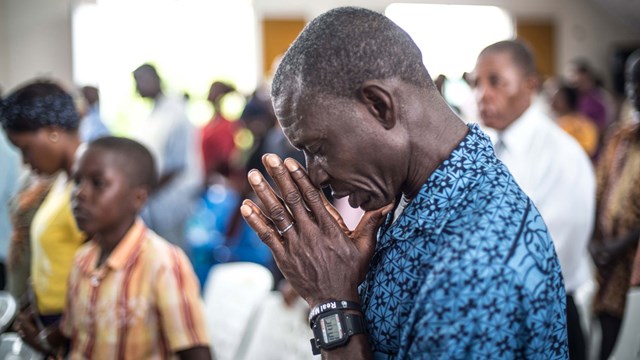Ministry leaders empower West African Christians to do what no government or hospital can do.

West Africa’s Ebola pandemic is far from over and the confirmed death total has surpassed 6,070. As it slows down in Liberia, the number of cases is accelerating in Sierra Leone, according to the World Health Organization (WHO).
Public health authorities are now expanding home-based observation and care for people newly exposed to Ebola. In an urgent bid to reduce new infections, many individuals and families are under quarantine for 21 days. Caring for people under quarantine is something tangible that churches, ministries, and trained volunteers could do. In the hardest hit nations (Sierra Leone, Liberia, and Guinea), there are in total about 8,600 churches and hundreds of Christian ministries.
One ministry to disabled African women is Memphis-based Women of Hope International. Kim Kargbo, the adult child of missionaries to Sierra Leone, founded Women of Hope in 2009. As the Ebola crisis grew worse, Women of Hope teamed up with the Global Community Health Evangelism Network in teaching and training local Christian leaders to respond to the Ebola pandemic. (They don’t do direct clinical work in treatment centers.)
Leaders drafted a unique written resource in English and French called “A Biblical Church Response to Ebola.” It is free online and explains a Scripture-based response model for churches, using 18 passages and historical references to the Black Plague, the yellow fever epidemic, and HIV/AIDS. Kargbo and Ruth Ada Kamara, Women of Hope’s Sierra Leonean program manager, returned to the United States to raise awareness about what American churches might do as well. They spoke recently with Timothy C. Morgan, CT senior editor, global journalism, and Deann Alford, a Texas-based journalist.
What vision are you casting of the church’s biblical response?
Kamara: As the body of Christ that God has placed in this world, we’re responsible for bringing the truth to people.
Kargbo: A Sierra Leone missions leader said that it’s time for the church to rise up and take a position of community leadership and help people break through lies and fear with truth. But Sierra Leone has a big sacred-secular divide. The church does church, and the medical community does medicine, and the government does policy.
Truth and knowledge empower Christians to act appropriately. They began to see the church’s part to play. This is more than a medical issue. It has to do with spiritual issues and truth. For training, we created materials that addressed specific health aspects and the underlying worldview issues driving the virus forward.
How do Christian leaders reach high-risk families and neighborhoods on the frontlines of the Ebola epidemic?
Kamara: Volunteers are trained about these issues in Community Health Evangelism (CHE). Each community health evangelist is assigned to travel the community teaching what Ebola is, its prevention, care for those infected and quarantined, and what the community should do. We recently trained 15 church leaders. Their role and the church’s role extend into taking care of the sick, praying and comforting in practical ways, such as outreach to the quarantined houses.
If the government doesn’t visit, as the body of Christ, we should visit. It doesn’t mean always that we can go into the houses, but people must see that we have concern for them. When churches learn of a nearby quarantined home, they should check on the people, ask whether they’re getting food. If they’re not, the church needs to step in.

No comments:
Post a Comment